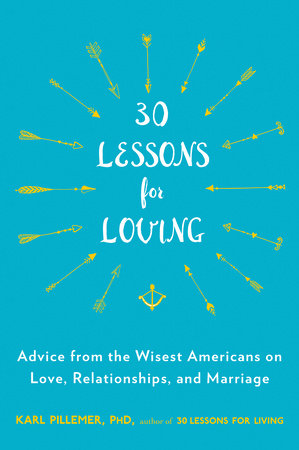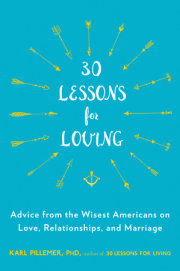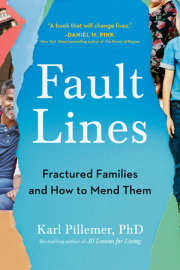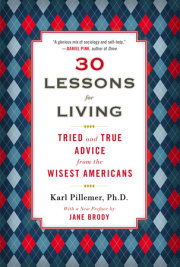***This excerpt is from an advance uncorrected proof***
Copyright © 2015 Karl Pillerner
CHAPTER 1
Evening the Odds:
Lessons for Finding a Mate
My advice? Be extremely careful about who you marry. The most important thing is to pick someone who is a good candidate for marriage. You can’t make something out of nothing. When you’re young, it’s easy to be bowled over by how someone looks. But that isn’t enough.
You need to look for things like fidelity, honesty, caring, and humor. Find out what their long-term goals are; what their feelings are about success, achievement, money, raising children. Outlook on religion is important, and another one is how they feel about their own family—their mother, father, siblings.
You have to think carefully about who you can actually live with. If you think things are funny and the other person doesn’t, you have a built-in problem. If you are tidy and the other person is a slob, you have a problem right from the beginning. If you hate the other person’s parents or family, you have a big problem. Add them up and some of these are big enough where you should look at them fairly and squarely and not marry the person. That’s how lots of people kid themselves—they say: “But I love him or I love her!” Sorry, but that’s not enough.
—Jennifer, 82, married 59 years
I sat in an upscale bistro in midtown Manhattan with five women in their midtwenties. My dinner companions included up-and-coming professionals in advertising, medical research, psychology, and the human services. They represented a range of relationship statuses: unattached, beginning a relationship, involved but experiencing doubts, and “nearly engaged.” In exchange for the best artisanal cheeses in New York City, I sought their answers to the question that launched this book: What do younger people want to know from the longest-married Americans about getting and staying married? I planned to interview hundreds of people, some of whom had been married twice as long as my guests had been alive. And I needed to know: What should I ask the elders?
A different place, a different time, another dinner. I’m in the basement of one of the liveliest student bars in my town, named after an infamous nineteenth-century serial killer. Joining me are eight fraternity brothers; we gorge on mounds of cheesy garlic bread, burgers, and fries. One intrepid member of my fraternity focus group takes on the “Monster Burger Challenge,” consuming a twenty-ounce bacon cheeseburger and a huge order of “loaded fries” in under a half hour (and winning a T-shirt in the bargain).
My query to both groups was, “What questions do you desperately want answered about relationships, love, and marriage?” I had expected the men and women to have markedly different ideas, but to my surprise there was one burning question for both groups. (I learned from other discussions that it also obsesses singles in their thirties, forties, and beyond.) And so it was among the first questions I asked hundreds of the oldest Americans:
“How do I know for certain that a person is the right one for me?”
In interviews, I pushed the elders on this topic. I asked for as much detail as they could provide on how someone in love can be certain that this particular man or woman is the one with whom to spend a lifetime. Are there special signs, a foolproof formula, a magic bullet to know that we’ve found Ms. or Mr. Right? After all that effort and countless hours of interview time, what was the definitive answer to that question? Umm, well, you see, actually, it’s . . .
You never know.
That’s right. Close to 100 percent of the experts are in agreement on this one point: You can never be absolutely sure that you have found the right person. In fact, the most common responses to that question—how do you know that you have found the right person to marry?—went like this:
You never know.
You can’t be 100 percent sure.
You’ve got to just take your chance.
I don’t think you can actually tell.
Do you ever know?
So where does that leave us on the topic of mate selection? Do we throw up our hands in despair? Fortunately, as you will see in this chapter, the elders actually have a treasure trove of advice about finding the right partner. Further, they believe that the best way to have a lifelong, fulfilling marriage is to make a very careful choice. So if there is no certainty about choosing your spouse, how should you go about it?
I found a mentor in Roxanne Colon, eighty-six, whom I interviewed at a neighborhood center in the South Bronx. While we were chatting before the interview began, I learned that Roxanne likes to gamble occasionally—she needed to end our interview on time because she was on her way to bingo (“It’s just twenty dollars,” she assured me). She was the first of the experts to give me the solution to the “you never know for sure” dilemma. Roxanne, like other elders, agreed it’s impossible to be certain you have made the right choice. But then she told me something very enlightening:
You know, to me, marriage is like a gamble. You get married and when it comes out good, you win. When it’s no good, you lose and you divorce. So that’s the way I looked at it. Sometimes the beginning is beautiful and then, you know, you’re playing roulette and if you win, you win—or then all of a sudden, you lose.
That sounded rather negative, and I told Roxanne so. She laughed and asked me if I was a gambler. I confessed that I enjoy going to a casino a few times a year. She raised her eyebrows and asked me: “Well, don’t you try to even the odds?” She went on:
So, okay, you accept that marriage is a gamble; you can’t ensure that things are perfect. But you can up the odds in your favor by how you choose somebody. You know, the values that you have, how you respect each other. Study the person before you get married and ask the tough questions. Like I said, marriage is a gamble. So what you do with the gamble is you try to make the odds in your favor.
Everything suddenly became clear. I thought back to an evening spent at a casino with my friend Peter. He used the opportunity to explain the arcane betting rules and strategies of the game of craps. It turns out that there is a wager in craps called the “free odd bet” that allows you to even the odds—at least on that one bet. I learned that you should always take that bet, but many people don’t because they aren’t aware of the benefits. The conclusion was clear: There is never any certainty in a game of chance like craps, but every sensible player does his or her best to even the odds by choosing bets care- fully. That’s exactly what the elders urge you to do in choosing a mate.
Have you ever had the experience of learning a new word, and then it seems like you see or hear it everywhere? After Roxanne Colon opened my eyes, I realized that many of the experts were making the same point. Like Karen Hopkins, sixty-seven, who told me: “It’s just like throwing the dice. You really don’t know. But you can feel it out by learning about the person, whether they’re right for you. By communicating with them and courting them you should learn that information.” Or Arthur Fields, seventy-two, who pointed out: “You don’t really know for sure; that’s the gamble. But if you date for some months and get along and are compatible and have similar interests, your chances are pretty good.”
So here’s what it comes down to, and what this chapter is about: evening the odds. There are many things you can do to push the odds of a good marriage in your favor. But the only time you get the chance is before you say “I do.” The experts, as we will see in Chapter 5, believe that trying to change your partner after marriage is a very bad bet. The more time and effort that you expend in making the right choice, the greater the chance of evening your odds of a happy marriage. Take the advice of Patricia Rannoch, eighty-three, on this one:
To be honest, right to the day you walk down the aisle, you’re still not sure. I have one unmarried son now and he’s asking me these questions. I said, “You really don’t have one hundred percent certainty that this is the right person.” Sometimes you just have to take a chance, you know? So you take a chance. But—make an educated guess! You have to really try to get to know each other.
In this chapter, the experts offer their advice on how to make your “guess” more educated—that is, to even the odds. They begin with lessons that help you understand what it means to “trust your heart” and “listen to your head”—and they insist you need to do both. They point out three key warning signs that a person may be definitely “wrong,” and they highlight the critical importance of making sure your core values align. To cap things off, we will learn five “trade secrets” of the oldest and wisest Americans for picking the right person for a lifetime.
Copyright © 2015 by Karl Phd Pillemer. All rights reserved. No part of this excerpt may be reproduced or reprinted without permission in writing from the publisher.






